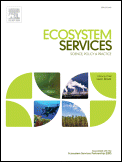
Ecosystem Services
Scope & Guideline
Bridging science and policy for ecological resilience.
Introduction
Aims and Scopes
- Valuation of Ecosystem Services:
The journal emphasizes methodologies for valuing ecosystem services, including economic, social, and cultural dimensions. This includes both market and non-market valuation approaches. - Integration of Ecosystem Services into Policy and Management:
Research published in the journal often explores how ecosystem services can be integrated into environmental policies and management practices, highlighting case studies and frameworks for effective governance. - Interdisciplinary Research:
The journal encourages interdisciplinary studies that encompass ecological, economic, sociological, and cultural perspectives on ecosystem services, promoting a holistic understanding of ecosystem dynamics. - Cultural and Social Dimensions of Ecosystem Services:
A significant focus is placed on understanding the cultural and social values associated with ecosystem services, including how different communities perceive and interact with their natural environments. - Impact of Climate Change on Ecosystem Services:
The journal addresses the effects of climate change on ecosystem services, investigating adaptive management strategies and resilience planning to mitigate adverse impacts. - Innovative Assessment Methodologies:
Research includes the development and evaluation of new tools and methods for assessing ecosystem services, such as remote sensing technologies and participatory approaches.
Trending and Emerging
- Nature-Based Solutions (NbS):
There is an increasing focus on nature-based solutions for addressing climate change and biodiversity loss, highlighting the role of ecosystem services in sustainable development and urban planning. - Indigenous Knowledge and Perspectives:
Emerging research emphasizes the integration of Indigenous perspectives in ecosystem services assessment and management, recognizing the value of traditional ecological knowledge in contemporary environmental governance. - Ecosystem Services Justice:
A growing body of work is exploring the concept of ecosystem services justice, focusing on equitable access to benefits derived from ecosystems and the social implications of ecosystem service provision. - Technological Innovations in Ecosystem Assessment:
Recent publications highlight advancements in technology, such as the use of remote sensing, big data, and machine learning, to enhance the assessment and monitoring of ecosystem services. - Interconnectedness of Ecosystem Services:
Research increasingly emphasizes the interconnections and trade-offs between different ecosystem services, promoting a more integrated approach to ecosystem management. - Cultural Ecosystem Services:
There is a rising interest in cultural ecosystem services, exploring how cultural values, heritage, and social well-being are linked to ecosystem health and services.
Declining or Waning
- Traditional Economic Valuation Techniques:
While economic valuation remains a core focus, there has been a noticeable decline in the use of traditional economic valuation methods, such as contingent valuation, as researchers increasingly explore more innovative and diverse approaches. - General Biodiversity Assessments:
The journal has seen fewer articles dedicated solely to general biodiversity assessments, as the focus shifts towards more specific interactions between biodiversity and ecosystem services. - Single-Dimensional Studies:
There is a decreasing trend in studies that analyze ecosystem services in isolation. Instead, interdisciplinary approaches that consider multiple ecosystem services and their interactions are becoming more prevalent. - Case Studies from Developed Regions:
Research focusing exclusively on ecosystem services in developed regions is declining, with a growing emphasis on case studies from developing countries and regions facing significant ecological challenges. - Static Assessments of Ecosystem Services:
The journal is moving away from static assessments that do not account for temporal changes in ecosystem service provision, reflecting a broader trend towards dynamic and adaptive management frameworks.
Similar Journals

Ecosistemas
Advancing ecological understanding for a sustainable future.Ecosistemas is a prominent Open Access journal published by the ASOCIACION ESPANOLA ECOLOGIA TERRESTRE, specializing in the field of ecology. Since its inception in 2001, it has dedicated itself to advancing ecological knowledge and research, fostering an inclusive platform for the dissemination of cutting-edge studies that span ecological interactions, sustainability, and biodiversity. The journal, based in Spain, has established its reputation with notable rankings such as Q3 in the field of Ecology and Q4 in Ecology, Evolution, Behavior, and Systematics, reflecting its commitment to quality research. With a Scopus Ranks position placing it in the 40th and 37th percentiles for its categories, Ecosistemas is integral to the academic community, serving researchers, professionals, and students alike. It provides a vital resource for those seeking to understand ecological dynamics and environmental challenges, facilitating open access to important findings and discussions that shape the future of our ecosystems.

Ecological Indicators
Transforming ecological data into actionable solutions.Ecological Indicators, published by Elsevier, is a prestigious journal dedicated to advancing the fields of ecology and environmental science. With an impressive impact factor and ranked in the Q1 quartile for both Ecology and Decision Sciences categories, the journal serves as a vital resource for researchers and professionals aiming to apply ecological knowledge to real-world problems. The journal covers a broad scope of topics within ecological indicators, aiming to provide comprehensive insights into biodiversity, ecosystem health, and sustainability metrics. Founded in 2001 and continuing through 2024, Ecological Indicators has established itself as a leader in disseminating significant research and innovative findings. The journal's standing is reflected in its remarkable Scopus ranks, placing it among the top percentile in its respective categories. Authors are encouraged to submit their work to share vital findings with an engaged audience of researchers, professionals, and dedicated students, ensuring the continued relevance and impact of ecological research on global environmental policies and practices.
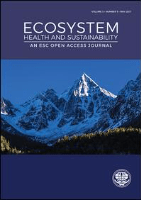
Ecosystem Health and Sustainability
Championing innovation in ecological research and policy.Ecosystem Health and Sustainability, published by the American Association for the Advancement of Science, is a premier journal in the field of ecological research and sustainability. Established as an Open Access journal since 2015, it has made significant strides in disseminating impactful research that addresses contemporary challenges in ecosystem health within a global context. With an impressive impact factor reflected in its consistent placement in the Q1 category across multiple fields—including Ecology, Evolution, Behavior and Systematics, as well as Management, Monitoring, Policy, and Law—this journal serves as a vital resource for researchers, professionals, and students alike. Based in the United Kingdom, the journal has shown notable performance in Scopus rankings, positioning itself within the top percentiles across various ecological specialties. As it continues its convergence through 2024, Ecosystem Health and Sustainability is committed to fostering the exchange of knowledge and promoting the integration of science and policy to advance sustainable practices globally.

Journal of Forest Economics
Fostering Interdisciplinary Insights for Sustainable ForestryJournal of Forest Economics is a leading academic journal published by NOW PUBLISHERS INC, dedicated to advancing the field of forest economics through rigorous interdisciplinary research. Established in 1995, the journal has become a critical platform for disseminating knowledge, focusing on the economic aspects of forestry, ecology, and environmental management. With its current impact factor, it holds a respectable Q3 quartile ranking across various categories including Ecology, Forestry, and Geography, Planning and Development, reflecting its relevance in these fields. The journal ensures wide accessibility to its research and caters to the scholarly community interested in the sustainability and economic viability of forest resources. The Scopus ranks further underscore its standing, highlighting its influence in the domains of Economics, Agricultural Sciences, and Environmental Science. As the landscape of forest economics continues to evolve, the Journal of Forest Economics remains an essential resource for researchers, professionals, and students striving for innovative solutions in forest resource management.

Earth Interactions
Unveiling the Interconnectedness of Earth’s SystemsEarth Interactions is a prominent journal that serves as a critical platform for interdisciplinary research in the field of Earth and Planetary Sciences. Published by the American Meteorological Society, this journal has established itself as a key resource for scholars, researchers, and professionals dedicated to understanding Earth's complex systems and their interactions. With an impressive Q1 ranking in the category of Earth and Planetary Sciences for 2023, it reflects a commitment to high-quality scholarship and impactful contributions to the field. The journal, with its dedicated coverage from 2004 to 2024, encompasses a wide array of topics, providing comprehensive insights into geological, atmospheric, and environmental phenomena. Although it operates under a non-open access model, its significance is underscored by its placement in the top percentile of Scopus rankings (Rank #89/195), making it an exciting resource for those pursuing advanced studies and applications related to Earth's systems.

AUSTRALIAN JOURNAL OF AGRICULTURAL AND RESOURCE ECONOMICS
Fostering dialogue for a sustainable agricultural future.Introducing the AUSTRALIAN JOURNAL OF AGRICULTURAL AND RESOURCE ECONOMICS, a premier publication dedicated to advancing the fields of agricultural and resource economics. Published by Wiley in the United Kingdom, this journal boasts an impressive Impact Factor, reflecting its significance and influence within its disciplines. Classified as Q1 in Agricultural and Biological Sciences and Q2 in Economics and Econometrics for 2023, it ranks among the top journals in these fields, with notable Scopus rankings of 16/193 and 121/716 respectively. With convergence from 1996 to 2024, the journal aims to disseminate innovative research, critical analysis, and empirical studies that address pressing economic issues in agriculture and resource management. Through its commitment to high-quality research and multiple open access options, the AUSTRALIAN JOURNAL OF AGRICULTURAL AND RESOURCE ECONOMICS serves as an essential resource for researchers, professionals, and students alike, fostering knowledge and dialogue in this vital area of study.

Geography and Sustainability
Exploring Interdisciplinary Solutions for Environmental Challenges.Geography and Sustainability is a prestigious, peer-reviewed journal published by Elsevier, focusing on the interdisciplinary fields of geography, ecology, and environmental science. As an Open Access publication since 2020, it aims to provide a platform for the dissemination of high-quality research that addresses critical sustainability challenges facing our planet. Based in China, the journal navigates through an impressive array of categories, all classified in the Q1 Quartile rankings for 2023, showcasing its top-tier status in areas such as Earth-Surface Processes, Geography, Planning and Development, and Nature and Landscape Conservation. With its notable impact factors—ranked 2nd in Earth and Planetary Sciences and 3rd in Environmental Science—it attracts contributions from leading experts and emerging scholars alike. Researchers, professionals, and students seeking to advance the scientific understanding of sustainability and its geographical implications will find indispensable resources and innovative findings within the pages of this journal.
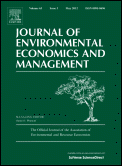
JOURNAL OF ENVIRONMENTAL ECONOMICS AND MANAGEMENT
Exploring Economic Strategies for a Greener Future.JOURNAL OF ENVIRONMENTAL ECONOMICS AND MANAGEMENT, published by Academic Press Inc Elsevier Science, stands as a leading platform for scholarly discourse at the intersection of environmental economics and management. Established in 1974 and continuing through 2024, the journal targets key issues in environmental policy, management strategies, and economic implications of environmental challenges, catering to an extensive audience of researchers, professionals, and students. It boasts a prestigious Q1 ranking in both Economics and Econometrics and Management, Monitoring, Policy and Law for 2023, underscoring its significant contribution to the field. Additionally, with outstanding Scopus rankings—placed in the 88th percentile for Economics and Econometrics and the 82nd percentile for Environmental Science—the journal is recognized for its rigorous peer-reviewed research. Although it follows a subscription model, the insights gained from its comprehensive articles are invaluable for addressing today’s pressing environmental and economic challenges.
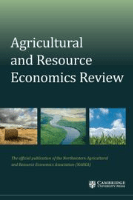
Agricultural and Resource Economics Review
Elevating the Discourse on Agricultural and Resource EconomicsAgricultural and Resource Economics Review is a leading peer-reviewed academic journal published by Cambridge University Press, dedicated to advancing scholarship in the fields of agricultural and resource economics. Since achieving Open Access status in 2016, it has significantly broadened its reach, allowing researchers, professionals, and students across the globe to engage with cutting-edge research and innovative methodologies. The journal, which boasts an impact factor reflective of its strong standing in both Agronomy and Crop Science (Q2) and Economics and Econometrics (Q2), aims to provide a platform for the dissemination of high-quality research that informs policy and practice in the agricultural sector. With a publication history spanning from 2004 to 2024, the journal continuously strives to foster interdisciplinary exchange and contribute vital insights that shape sustainable resource management. Emphasizing quantitative analysis and empirical research, Agricultural and Resource Economics Review remains a crucial resource for those involved in the dynamics of agricultural economics and resource management in today's ever-evolving landscape.
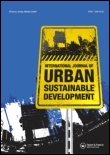
International Journal of Urban Sustainable Development
Fostering collaboration for impactful urban development.The International Journal of Urban Sustainable Development is a premier peer-reviewed journal published by Taylor & Francis Ltd, dedicated to advancing knowledge in the field of urban sustainability. With an ISSN of 1946-3138 and an E-ISSN of 1946-3146, this journal has gained recognition for its high-quality research, attaining Q1 status in multiple categories including Development, Geography, Planning and Development, and Urban Studies, per the 2023 category quartiles. Open Access since 2022, the journal ensures that groundbreaking research is widely accessible to scholars, practitioners, and policy-makers alike, enhancing its reach and impact. Operating from the United Kingdom, it focuses on a diverse array of topics related to urban environments and sustainable practices, supporting innovation and policy development. As a result, the journal holds significant placements in Scopus rankings, notably ranking #62 in Urban Studies, underscoring its pivotal role in shaping the future of sustainable urban development globally.